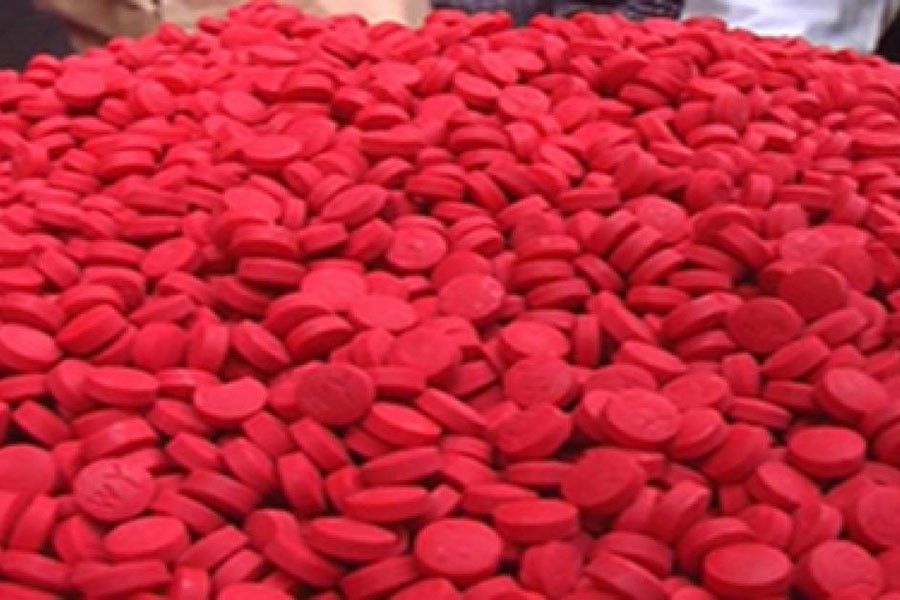Yaba market keeps swelling despite increased vigilance
Confiscations by agencies explode to 40m in 2017

Published :
Updated :

The market of contraband drug Yaba could not be controlled even after taking measures by various quarters.
Worries now have mounted over the rising addiction among youths, official data shows.
There are no specific statistics on the market size of this particular drug. None has ever conducted a nationwide survey to know the extent of financial involvement and impact of the drug use on the society.
But the number of confiscations of the drug by law-enforcement agencies over the last eight years suggest that the abuse of the amphetamine-type stimulant (ATS), commonly known as Yaba, grew very fast and it dominates the country's illicit drug market because of its easy availability.
Teens and youngsters of affluent families are its main consumers. The drug makes its users excited and gives them an instant euphoric feeling but it leaves a deadly effect on the users in the long term.
Officials and anti-drug activists said the volume of the stimulating tablet the law-enforcement agencies seize every year is just a small portion of the tablets entering the country.
According to the Department of Narcotics Control (DNC), law enforcement agencies seized 0.8 million Yaba tablets in 2010. But the number gradually increased to 1.3 million in 2011, 1.9 million in 2012, 2.8 million in 2013, 6.7 million in 2014, 20 million in 2015 and 29.5 million in 2016. In 2017, the volume rose to over 40 million.
The confiscations do indicate that the use of Yaba and the trade associated with it have recorded a phenomenal rise over the years much to the concerns of guardians and the law enforcement people.
When contacted, director general of the narcotics department Md. Jamal Uddin Ahmed admitted there had been substantial increase in the Yaba inflow. The contraband drug was entering the country from every corner.
Despite having various limitations, they have intensified their watch throughout the country to prevent the illegal trades, he said.
"It cannot be stopped by the law enforcement people alone. People need to be conscious about the consequences of the banned drugs," he said.
Seeking anonymity, an intelligence official at the narcotics department said law enforcement agencies recently busted a Yaba-manufacturing factory in the capital, giving an indication that the expertise in making the harmful tablets has been developed locally, which is alarming.
He said Yaba has a high demand in Dhaka. But the transportation involves great risk and that is why drug traders moved to set up manufacturing plant in and around the city.
He feared that more Yaba manufacturing factories might be there inside the country. The materials to produce the tablets are easily available on the domestic market. Such a factory can even be operated in a small room, he said.
"You will find Yaba in every part of the city. All the security agencies stepped up their vigilance but the use and trade have kept increasing. All must come up to prevent the social menace," he added
Over the last couple of years, security officials discovered Yaba-making factories at Mirpur, Demra, Jatrabari and Banasree in the capital and in Chattagram.
The growing use of Yaba was also reflected in the service delivery of country's growing rehabilitation centres, where the addicts get admitted for treatment.
Social service officer at the state-owned Central Drug Addiction Treatment Centre Ruzena Islam said around 70 per cent of their patients was Yaba-addicts.
"Addicts of other drugs are now moving to Yaba because of its easy availability here," she said.
Expressing concerns over the growing use of Yaba, Dr Arup Ratan Choudhury, founder president of the Association for Prevention of Drug Abuse (MANAS), said that while the demographic dividend puts Bangladesh in an advantageous position, contraband drugs are sapping the energy of youth population.
Youths constitute over one-third of the country's population of 160 million.
"But contraband drugs are sapping the energy of the working age people from whom the country expects more. So, it is not only destroying an individual but the country as a whole," he said.
According to the advocacy group, the addicts spend at least Tk 70 billion a year on drugs and the amount is increasing day by day.
jubairfe1980@gmail.com


 For all latest news, follow The Financial Express Google News channel.
For all latest news, follow The Financial Express Google News channel.